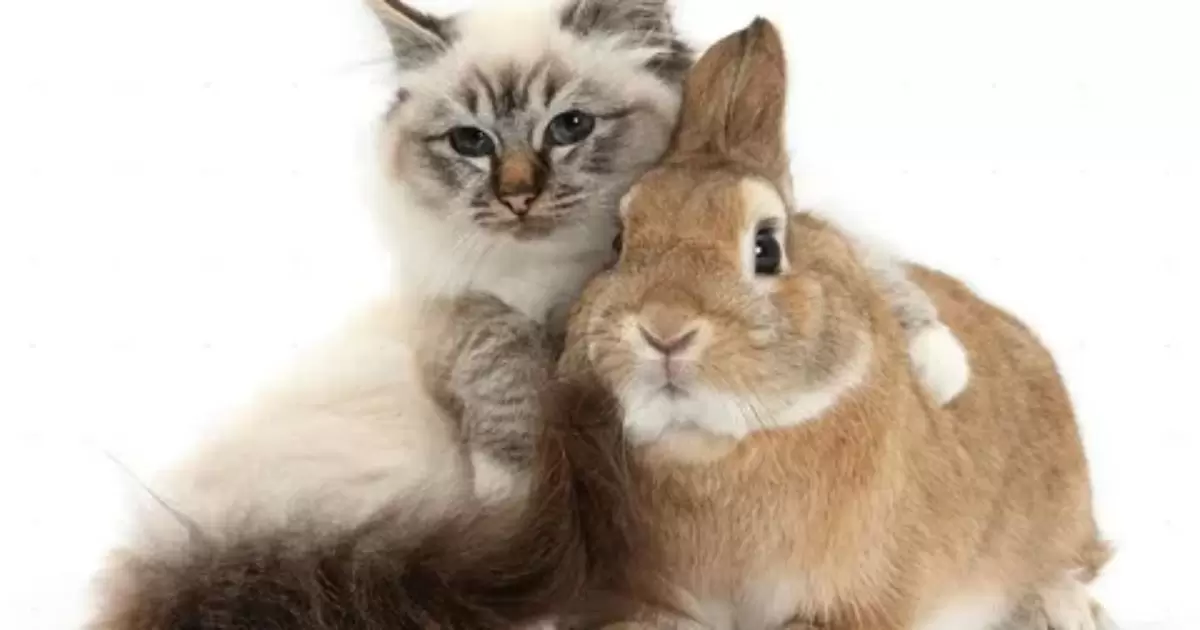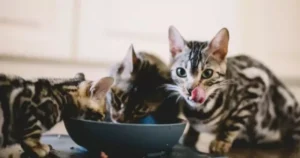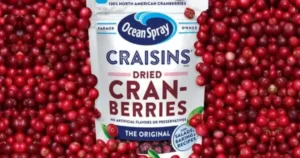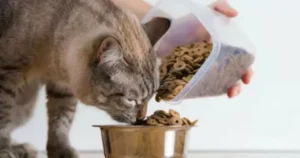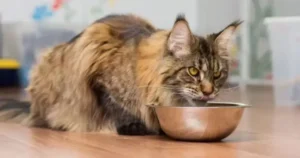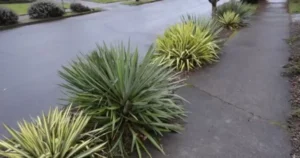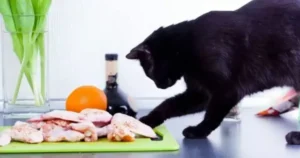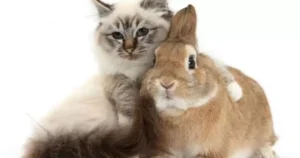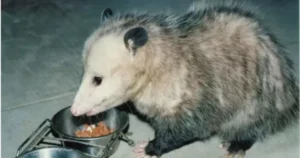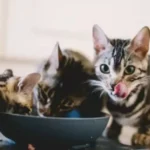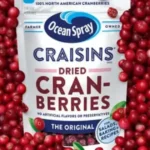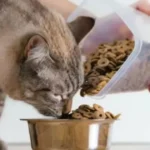Ever wondered what would happen if your curious rabbit accidentally nibbled on your cat’s food? While it might seem harmless, the consequences of a rabbit consuming cat food can be severe and potentially life-threatening. In this comprehensive guide, we’ll delve into the reasons why cat food is unsuitable for rabbits and explore the potential risks associated with this dietary mishap.
Understanding the Nutritional Needs of Rabbits
Rabbits are herbivores, meaning their digestive systems are designed to process a diet rich in fibrous plant matter. Their nutritional requirements differ significantly from those of cats, which are obligate carnivores.
The Importance of a High-Fiber Diet
Rabbits require a diet high in fiber to maintain proper digestive function. Hay, which should make up the bulk of their diet, provides the necessary fiber to keep their delicate digestive systems functioning correctly. Insufficient fiber intake can lead to potentially fatal conditions like gastrointestinal stasis, where the digestive system slows down or stops entirely.
Protein Levels and Other Dietary Considerations
Unlike cats, rabbits have lower protein requirements. Cat food, which is formulated for their carnivorous needs, contains higher levels of protein and fat than what is suitable for rabbits. Excessive protein and fat consumption can lead to obesity, liver and kidney problems, and other health issues in rabbits.
The Rabbit’s Digestive System: A Delicate Balance
Rabbits have a unique digestive system that relies on a constant flow of fibrous material to function correctly. Their digestive tract is designed to extract nutrients from hay and other plant matter through a process called hindgut fermentation.
In this process, specialized gut bacteria break down the fiber in the cecum (a pouch located at the junction of the small and large intestines). The resulting nutrients are then absorbed through the cecum and colon, providing the rabbit with essential vitamins, minerals, and energy.
Disrupting this delicate balance by introducing inappropriate foods, like cat food can have severe consequences. The high protein and fat content can disrupt the bacterial population in the cecum, leading to digestive distress, malnutrition, and even life-threatening conditions.
The Risks of Feeding Cats’ Food to Rabbits
While a single accidental ingestion of a small amount of cat food may not cause immediate harm, prolonged consumption or large quantities can have severe consequences.
- Digestive Distress
- The high protein and fat content in cat food can lead to gastrointestinal issues like diarrhea, bloating, and potential blockages.
- Lack of sufficient fiber can cause digestive slowdown or stoppage, leading to painful and potentially life-threatening conditions.
- Obesity and Related Health Problems
- Cat food is energy-dense, and overconsumption can quickly lead to obesity in rabbits.
- Obesity increases the risk of other health issues, such as liver and kidney disease, arthritis, and respiratory problems.
- Nutritional Imbalances
- Cat food lacks essential nutrients that rabbits require, such as high levels of fiber, calcium, and specific vitamins and minerals.
- Prolonged consumption of an imbalanced diet can lead to nutritional deficiencies and subsequent health problems.
- Urinary Issues
- The high levels of protein and minerals in cat food can contribute to the formation of bladder sludge and urinary calculi (stones) in rabbits, causing painful and potentially life-threatening urinary tract issues.
Case Study: The Consequences of Feeding Cat Food to a Pet Rabbit
To illustrate the potential dangers, let’s consider the case of Thumper, a 2-year-old dwarf rabbit whose owner accidentally left a bowl of cat food within reach. Over the course of a week, Thumper consumed a significant portion of the cat food before the owner realized the mistake.
Within days, Thumper began exhibiting signs of digestive distress, including lethargy, decreased appetite, and soft, misshapen fecal pellets. Upon examination by a veterinarian, Thumper was found to be severely dehydrated and suffering from gastrointestinal stasis.
After several days of intensive treatment, including fluid therapy, pain management, and specialized digestive support, Thumper’s condition stabilized. However, the veterinarian cautioned that prolonged consumption of an inappropriate diet could have led to severe complications, including organ failure and potential death.
Preventing Accidental Ingestion of Cat Food
Preventing your rabbit from accessing cat food is crucial to ensuring their health and well-being. Here are some tips to keep your furry friends safe:
- Separate Feeding Areas
- Keep your rabbit’s and cat’s food bowls in separate areas, preferably in different rooms or at least a safe distance apart.
- Consider using baby gates or other barriers to restrict access to areas where cat food is present.
- Secure Food Storage
- Store cat food in airtight containers or cabinets that your rabbit cannot access.
- Ensure that any spilled or scattered cat food is immediately cleaned up to prevent accidental ingestion.
- Supervision During Feeding Times
- Supervise your pets during feeding times to ensure that your rabbit doesn’t inadvertently consume cat food.
- Separate them during mealtimes if necessary.
- Rabbit-Proof Your Home
- Rabbits are curious creatures and may explore areas where cat food is present.
- Rabbit-proof your home by blocking off access to areas where cat food is stored or served.
- Educate Family Members and Guests
- Ensure that everyone in your household understands the importance of keeping cat food away from your rabbit.
- Inform guests and visitors about the potential risks and ask them to be mindful of leaving any food accessible to your rabbit.
Signs of Digestive Issues and Seeking Veterinary Care
If your rabbit has accidentally consumed cat food, it’s essential to monitor them closely for any signs of digestive distress. Early intervention can help prevent more severe complications.
Signs to Watch For:
- Decreased appetite or refusal to eat
- Lethargy or lack of energy
- Soft, misshapen, or smaller fecal pellets
- Bloating or abdominal discomfort
- Diarrhea or constipation
- Grinding of teeth (a sign of pain or discomfort)
If you notice any of these signs, or if your rabbit appears to be in distress, it’s crucial to seek immediate veterinary attention. Prompt treatment can help alleviate discomfort, address any underlying issues, and prevent further complications.
Veterinary Care and Treatment Options
Depending on the severity of the situation, your veterinarian may recommend various treatment options, including:
- Fluid therapy to address dehydration
- Pain management and anti-inflammatory medications
- Motility-enhancing medications to stimulate the digestive system
- Dietary management, including a transition to a high-fiber, low-protein diet
- Supportive care, such as syringe feeding or force-feeding if necessary,
In severe cases, hospitalization and intensive care may be required to stabilize your rabbit’s condition and prevent life-threatening complications.
Preventing Future Incidents
Once your rabbit has recovered, it’s essential to take steps to prevent future incidents of accidental ingestion of cat food. This may involve:
- Implementing stricter pet food storage and feeding protocols
- Increasing supervision during feeding times
- Enhancing rabbit-proofing measures around your home
- Providing ongoing education to family members and guests
Remember, prevention is key when it comes to protecting your rabbit’s health and well-being.
FAQS:
Is cat food detrimental to rabbits’ health?
Yes, cat food is highly unsuitable and potentially hazardous for rabbits due to its high protein, fat, and mineral content, which can lead to severe digestive issues, obesity, and other health problems.
Can lagomorphs consume feline or canine kibble?
No, rabbits should never be fed cat or dog food, as their nutritional requirements differ significantly from those of carnivores, and such diets can cause severe health complications.
What happens if a feline ingests lagomorph fare?
While not ideal, a cat consuming a small amount of rabbit food is unlikely to cause significant harm, as cats are able to digest plant-based diets in moderation.
Can feline companions transmit illnesses to lagomorphs?
Yes, cats can potentially pass on certain diseases and parasites to rabbits through direct contact or shared living spaces, making proper hygiene and veterinary care crucial for both species.
Conclusion:
While it may be tempting to share your cat’s food with your rabbit, the risks associated with this practice are significant and potentially life-threatening. By understanding the nutritional needs of rabbits and taking proactive measures to prevent accidental ingestion of cat food, you can ensure the long-term health and happiness of your furry companion.
If you suspect your rabbit has consumed cat food, acting quickly and seeking veterinary care is crucial. With proper care and dietary management, most rabbits can recover from the effects of accidental ingestion, but it’s always better to prevent such incidents from occurring in the first place.
Prioritize your rabbit’s well-being by providing a balanced, high-fiber diet and a safe, rabbit-friendly environment. Your furry friend will thank you with a lifetime of companionship and joy.
